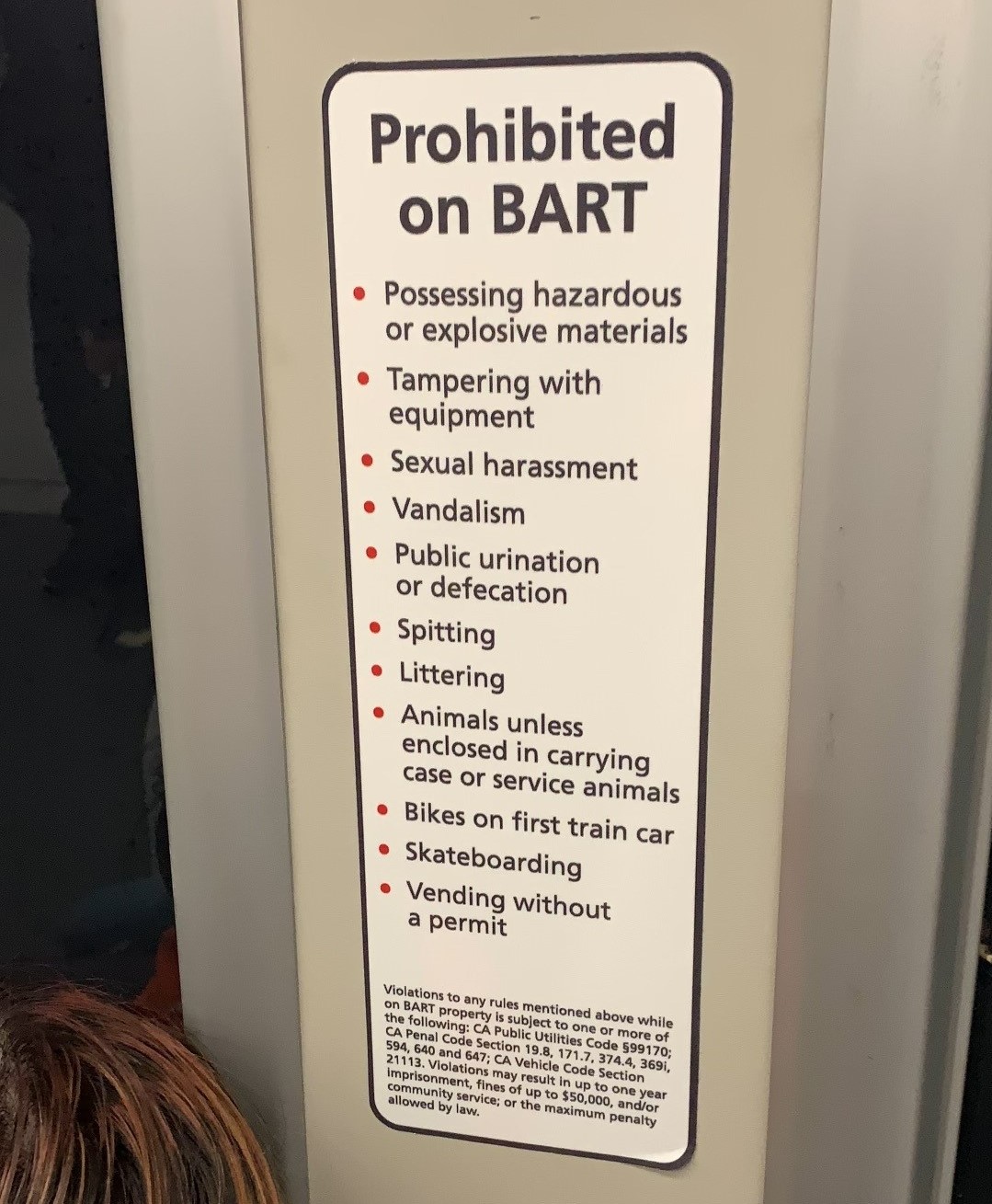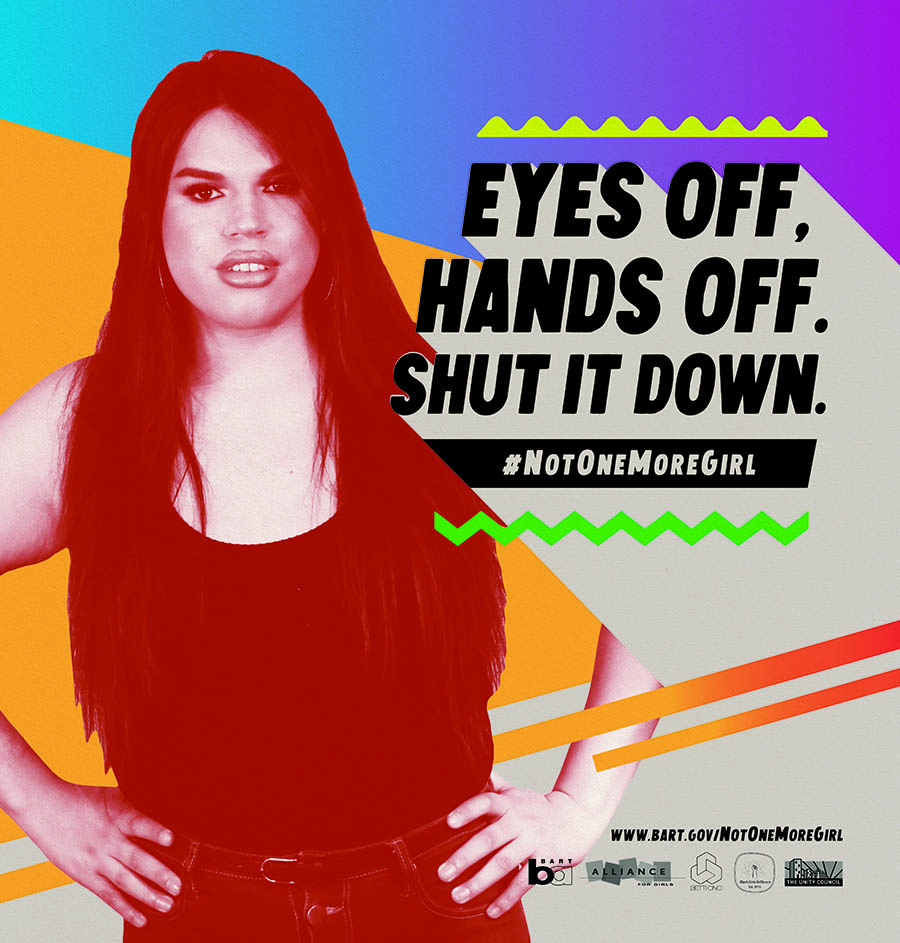Initiative to prevent sexual harassment on BART showing signs of progress
One year following the launch of BART’s groundbreaking “Not One More Girl” campaign to bring awareness to sexual harassment on transit, rider survey data indicates the initiative is helping reduce harassment and improve the perception of safety on BART. BART has been working with the Alliance for Girls, Betti Ono, Black Girls Brilliance, The Unity Council’s Latinx Mentorship and Achievement (LMA) Program, and a group of Alliance for Girls advocacy member organizations to engage local girls and gender expansive youth about their experiences on BART and to develop cultural strategies to prevent, interrupt, and address gender-based harassment and violence on transit.
Encouraging Data
As part of the initiative, BART began collecting ongoing rider data about harassment through the Passenger Environment Survey. BART added the question: Have you experienced gender based sexual harassment in the last six months at BART? The percentage of riders answering yes has gone from a high of 12% during the period covering January-June 2021 to now 7%.
| Time Period | % answering "yes" |
| Oct-Dec 2020 | 10% |
| Jan-Mar 2021 | 12% |
| Apr-Jun 2021 | 12% |
| Jul-Sept 2021 | 8% |
| Oct-Dec 2021 | 7% |
BART also conducted surveys to measure the impacts of the Not One More Girl campaign. An online survey among randomly selected BART riders showed the effort raised awareness about sexual harassment and what to do if it occurs and it made people feel safer when riding BART.
- 65% responded they are more aware of sexual harassment/gender-based violence
- 59% responded they now know what to do if they witness harassment/gender-based violence on BART
- 52% responded they know more about how sexual harassment/gender-based violence impacts girls, transgender, and gender non-conforming people on BART
- 46% responded they know where to get help if they experience sexual harassment/gender-based violence on BART
- 36% responded they felt safer riding BART
Surveys that were provided at in-person Not One More Girl pop-up events in 2021, had even higher scores with 43% of respondents feeling safer riding BART after learning about the initiative.
Active Use of New Reporting Tool
BART also added the new reporting category, “Unwanted sexual harassment (non-criminal)” to the BART Watch app in March 2021. To date, 29 sexual harassment incidents have been reported through the app. Many provided enough information to have officers immediately dispatched to check on the situation.
Examples of reports include:
- There is a group of men harassing women going down the stairs to BART.
- This man has been staring at me and making sexual comments about me. Tried to grab me but others were around.
- This man sitting in the back has been following me and constantly asking me questions and staring at me, I feel very uncomfortable and I’m just on my way home from school. Please have someone waiting for him at the West Oakland BART Station where I will get (off), and he will continue to follow me.
New Decals Being Added
 At the launch of the campaign, the BART Board of Directors amended BART’s code of conduct to include the prohibition of sexual harassment, marking the first time a behavior that is not against the penal code or existing law was added. Decals onboard new trains have been updated to include “sexual harassment.”
At the launch of the campaign, the BART Board of Directors amended BART’s code of conduct to include the prohibition of sexual harassment, marking the first time a behavior that is not against the penal code or existing law was added. Decals onboard new trains have been updated to include “sexual harassment.”
Another decal outlining what to do if you experience gender-based violence or sexual harassment are being added to all restrooms.
New Safety Staff Prevent Harassment
The group recommended BART increase unarmed safety personnel such as transit ambassadors across the system and hire youth leaders with a violence prevention background to be on the hiring panels for such roles. BART recently finished hiring all ten ambassadors and 15 of the planned 20 Crisis Intervention Specialists. These unarmed employees who speak multiple languages and are trained in de-escalation and anti-bias techniques have bolstered presence on trains and on platforms. They are playing an important role in preventing and interrupting harassment – including sexual harassment, street harassment, as well as hateful actions and language.
Next Phase of the Not One More Girl Campaign
Not One More Girl is a community driven initiative centering girls and gender expansive youth to reimagine safety for riders on BART. The second phase of the campaign is being developed now and will be launched in the coming months. Elements will include advancing bystander intervention training for riders, building power through integrated arts and cultural engagements with particular focus on the transgender community and transit-dependent girls, curated events, and additional surveys to measure impact and effectiveness.
Quotes from Stakeholders
Anyka Howard, Director of Betti Ono:
“Safety on public transit is a civil rights issue. When Black and Latinx girls and gender expansive youth can travel freely through the city with no threat of harm, we are all safer. These communities have a right to be protected. The culture of violence on our public transit systems is unacceptable. This initiative shows what can happen when transit agencies are accountable to the wellbeing of their riders and make a deep commitment to collaborate with those most impacted to provide safe and just passageways. Together we are transforming the culture of ridership.”
Dr. L.B. Williams, Founding Director of Black Girls Brilliance (BGB)
"As we approach the one-year anniversary of the Not One More Girl Campaign, we are reminded of the importance of centering the lives and the voices of girls and gender expansive youth. The combined efforts of the youth and community centered organizations envisioned what Radical Safety on public transportation can be like for girls and gender expansive youth who have historically been impacted by unsafe encounters in these spaces. We are also celebrating this work to remind our community stakeholders that we are not done. We are one year into a lifelong journey of the systemic, institutional, and community changes that need to happen in order to make Radical Safety on public transportation a normed experience."
Uche Esomonu, Membership Services Fellow at Alliance for Girls and youth leader for Not One More Girl:
I remember sitting among a group of girls in one of our earlier sessions for the Not One More Girl campaign brainstorming suggestions for girls' safety that we would like to see on Bart trains. I don’t think any of us could’ve imagined that those suggestions would be taken to heart and implemented across BART. Seeing the Not One More Girl flyers spring up across stations has been the most surreal. For many, these may just be enlarged pictures with hashtags, but for me and I think for many girls too, it’s finally naming an issue that has plagued our daily lives. It’s giving credence to our experiences and kind of empowering us to no longer suppress them but to speak out.
Emma Myerson, Founding Executive Director of Alliance for Girls:
"As we celebrate the one-year anniversary of the Not One More Girl Campaign, we are also celebrating the magic that can happen when girls speak up and when their voices are listened to. We are celebrating the power of intergenerational communities organized for change. And we are celebrating the tremendous impact that is made possible when policy change is inextricably connected to cultural power."
Marianne Ceballos, Associate Director of Youth Services at the Unity Council:
“As we commemorate the achievements of the NOMG campaign this past year, we also recognize the need for continuing this work towards Radical Safety on public transit. Being part of this collaborative process allowed us to re-envision a new way of working with agencies, youth and communities for the greater good. Other organizations and transit agencies nationwide now have a blueprint to address this pervasive issue of harassment and violence affecting generations of Black and Latinx girls and gender expansive youth.”
